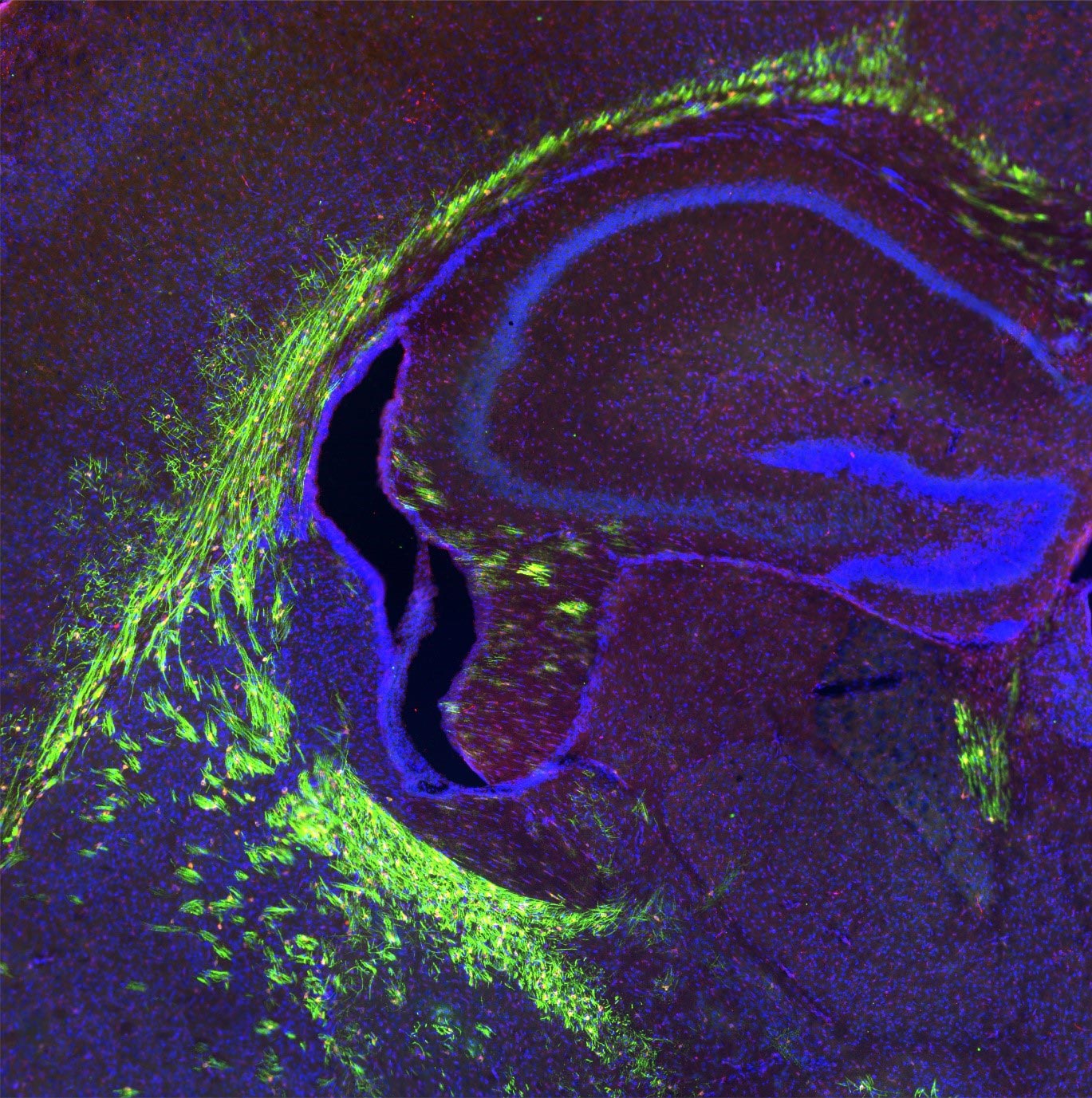

Creierul modelului preclinic în curs de dezvoltare cu axoni mielinizați (prezentat în verde). Oamenii de știință din Singapore au descoperit rolul critic al proteinei transportoare Mfsd2a în reglarea celulelor creierului care mențin învelișul de mielină, membrana izolatoare care învelește nervii. Aceste rezultate publicate în Journal of Clinical InvestigationPoate ajuta la reducerea efectelor îmbătrânirii asupra creierului. Mfsd2a transportă lisofosfatidilcolina (LPC), o lipidă care conține acizi grași omega-3, către creier pentru mielogeneză. Credit: Dr. Vetrivel Sengotuvil
Cercetătorii au descoperit că proteina transportor Mfsd2a este esențială pentru reglarea celulelor creierului care mențin învelișurile de mielină care protejează nervii. Această descoperire ar putea ajuta la reducerea efectelor îmbătrânirii asupra creierului și ar putea duce la tratamente pentru tulburările neurologice cauzate de mielogeneza redusă.
Oamenii de știință din Singapore au demonstrat rolul crucial pe care îl joacă o proteină transportoare specială în reglarea celulelor creierului, care asigură protecția nervilor prin învelișuri numite teci de mielină. Descoperirile, publicate de cercetătorii de la Duke-NUS Medical School și de la Universitatea Națională din Singapore în Journal of Clinical InvestigationPoate ajuta la reducerea efectelor nocive ale imbatranirii asupra creierului.
O membrană izolatoare care înconjoară nervii, tecile de mielină facilitează conducerea rapidă și eficientă a semnalelor electrice în întregul sistem nervos al corpului. Când teaca de mielină este deteriorată, nervii își pot pierde capacitatea de a funcționa și pot provoca tulburări neurologice. Odată cu vârsta, tecile de mielină pot începe în mod natural să se deterioreze, motiv pentru care persoanele în vârstă își pierd capacitățile fizice și mentale.
Pierderea tecilor de mielină are loc în timpul procesului normal de îmbătrânire și în bolile neurodegenerative, cum ar fi scleroza multiplă și[{” attribute=””>Alzheimer’s disease,” said Dr. Sengottuvel Vetrivel, Senior Research Fellow with Duke-NUS’ Cardiovascular & Metabolic Disorders (CVMD) Program and lead investigator of the study. “Developing therapies to improve myelination—the formation of the myelin sheath—in aging and disease is of great importance to ease any difficulties caused by declining myelination.”
To pave the way for developing such therapies, the researchers sought to understand the role of Mfsd2a, a protein that transports lysophosphatidylcholine (LPC)—a lipid that contains an omega-3 fatty acid—into the brain as part of the myelination process. From what is known, genetic defects in the Mfsd2a gene leads to significantly reduced myelination and a birth defect called microcephaly, which causes the baby’s head to be much smaller than it should be.

Dr. Sengottuvel Vetrivel (left) and Prof David Silver (right). Credit: Duke-NUS Medical School
In preclinical models, the team showed that removing Mfsd2a from precursor cells that mature into myelin-producing cells—known as oligodendrocytes—in the brain led to deficient myelination after birth. Further investigations, including single-cell RNA sequencing, demonstrated that Mfsd2a’s absence caused the pool of fatty acid molecules—particularly omega-3 fats—to be reduced in the precursor cells, preventing these cells from maturing into oligodendrocytes that produce myelin.
“Our study indicates that LPC omega-3 lipids act as factors within the brain to direct oligodendrocyte development, a process that is critical for brain myelination,” explained Professor David Silver, the senior author of the study and Deputy Director of the CVMD Program. “This opens up potential avenues to develop therapies and dietary supplements based on LPC omega-3 lipids that might help retain myelin in the aging brain—and possibly to treat patients with neurological disorders stemming from reduced myelination.”
Previously, Prof Silver and his lab discovered Mfsd2a and worked closely with other teams to determine the function of LPC lipids in the brain and other organs. The current research provides further insights into the importance of lipid transport for oligodendrocyte precursor cell development.
“We’re now aiming to conduct preclinical studies to determine if dietary LPC omega-3 can help to re-myelinate damaged axons in the brain,” added Prof Silver. “Our hope is that supplements containing these fats can help to maintain—or even improve—brain myelination and cognitive function during aging.”
“Prof Silver has been relentless in investigating the far-reaching role of Msdf2a ever since he discovered this important lipid transport protein, alluding to the many possible ways of treating not only the aging brain but also other organs in which the protein plays a role,” said Professor Patrick Casey, Senior-Vice Dean for Research. “It’s exciting to watch Prof Silver and his team shape our understanding of the roles that these specialized lipids play through their many discoveries.”
Reference: “Deficiency in the omega-3 lysolipid transporter Mfsd2a leads to aberrant oligodendrocyte lineage development and hypomyelination” by Vetrivel Sengottuvel, Monalisa Hota, Jeongah Oh, Dwight L. Galam, Bernice H. Wong, Markus R. Wenk, Sujoy Ghosh, Federico Torta and David L. Silver, 27 April 2023, The Journal of Clinical Investigation.
DOI: 10.1172/JCI164118

„Mândru pasionat al rețelelor sociale. Savant web fără scuze. Guru al internetului. Pasionat de muzică de-o viață. Specialist în călătorii.”





More Stories
Simulările pe supercomputer dezvăluie natura turbulenței în discurile de acumulare a găurilor negre
Trăiește cu anxietate: sfaturi de specialitate despre cum să accepti o afecțiune de sănătate mintală
Noile cercetări asupra unei falii masive de tracțiune sugerează că următorul cutremur mare ar putea fi iminent